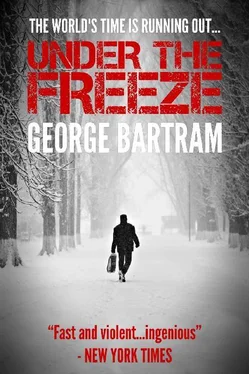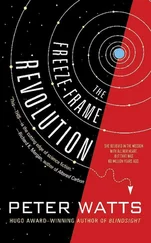“I did not think to see you again,” Andropov said mildly. He looked bemused, like a busy man with other things on his mind. “What is it you want?”
“I want a chance to stay alive. I want to be put secretly on a different flight to the West.”
“You got me here for that?”
“Don’t you want the truth about Maxudov?”
Andropov was looking down at his hands, already thinking about something else. “I am satisfied that we have the truth,” he said. He took a single sheet of paper from an inner pocket and began to read it.
“Would you be dissatisfied if I found something different?”
“You do not think it is Beranyi?”
“I don’t have the facts. Comrade Secretary, the facts will come out sooner or later. If one of the Western intelligence services finds that it was not Beranyi, they will use it against you. They will try to humiliate you. If it is not Beranyi, there will be trouble. Great trouble. And if it is not Beranyi — Maxudov is still one of you.”
“You chose not to stay in Moscow?”
“If I return to the West, I will be killed by Department Five. If I stay in Moscow, I will live, at least for a little while. Is that a choice, to stay alive? Not a very flattering reason for me to choose Moscow.”
Andropov raised his head; his heavy-lidded eyes looked sleepy. “Moscow will survive not being flattered by you, I suppose.”
Tarp could feel the man’s attention slipping away from him. “Comrade Secretary, I am not asking for much! Let me leave the Soviet Union safely, and I will abide by the contract I made with Repin! And I would expect you to abide by it, as well.”
Andropov looked down at the paper again, and Tarp thought he had lost him. Andropov said, however, with real curiosity, “Why do you so much want the truth? Is it for the money?”
“It’s what I set out to do.”
Andropov looked piercingly at him. His eyes flicked back and forth between Tarp’s eyes. “You mean — you are a craftsman,” he said after some seconds of this examination. “Now I understand.” He shifted his weight and looked at the door, his concentration already moving toward the Great Hall. “Very well. Tell my assistant how you want to leave the country.”
“Thank you, Comrade Secretary.”
“But naturally, I will accept the committee’s recommendation that this case is closed. Unless you find differently very quickly, our arrangement is ended.”
He went out quickly. Tarp saw him pause by another man and bend his head to say a few words. The other man glanced toward Tarp. Andropov moved away, and there was a general motion to follow him among figures scattered around the antechamber. Then, as a door opened somewhere out of sight, a patter of applause began and swelled and became a sound like rain.
The man beckoned him. Tarp went into the antechamber. The room was empty except for the two of them, with that air of suspended time that comes when a great deal of activity has been ended abruptly. Smoke was still rising from a cigar that had been left in an ashtray; half-filled glasses stood on small tables and even on the floor.
“We are to go at once,” the man said.
“All right.”
“We go straight to the airport. His orders.”
“Fine.”
“We’ll check the flights when we get there.”
Tarp was driven out of Moscow in his Russian suit and shoes and sweater, without going back to his apartment, without speaking again to Strisz. It was late in the day and the sky was darkening, and many cars moved with their headlights on. As they passed the Gorky statue, a few flakes of wet snow began to fall. The river was running free of ice in the middle. Like the pond in Maine by now . He wondered if it was ice-free yet.
There was a girl on a corner where the car stopped for traffic. She wore a raincoat too light for the season and she looked harried by her life, by petty annoyances and perhaps by the huge annoyance of trying to be happy. She was pretty and intelligent-looking, fair and yet somehow like Juana. Their eyes met. She did not smile, but she did not look away. An unhappy woman , but a realist . The car moved slowly forward and he turned his head to watch her. Good - bye , Moscow .
He thought they might drive him into the country and kill him. He had little trust in Andropov’s word. He remembered Hungary too well — 1956, and promises that were broken, and a Russian ambassador who was now the general secretary. When they were waiting in a badly heated room at the airport, he thought that Falomin’s men might come in and take him. Then they ran out to the aircraft after the stairs had been pulled away and ducked under the huge body and went up the emergency after-stair. He ran up three at a time, feeling the stair bend under him. He and two security men sat in a row of three seats at the back, behind a beige curtain so the other passengers could not see them.
One of the men handed him his French passport, his other French papers, and his credit card. The other had four hundred dollars in deutsch marks.
“We didn’t have time to change the money,” he said.
I hope you didn’t have time to change anything else , either .
They flew to Helsinki. Tarp got off alone, looking for the ones who would be waiting to kill him. He put distance between himself and other people, suspecting knives, syringes. He looked far ahead down Helsinki’s sterile passages, looking for the terrorist who had been sent to kill him.
He got on the first flight out and went to Malmo, where he rented a car and drove through the black night of the Swedish winter, watching behind him for headlights that never appeared.
Good - bye , Moscow .
She stirred in his arms and murmured something in Spanish. Lying awake, he had been thinking of Moscow, and the slurred Spanish had sounded alien to him. She had been sleeping heavily, keeping contact with him as if, even in sleep, she wanted assurance that he was alive.
He had come up the road to the farmhouse on foot after two days in Paris with Laforet and “Mr. Smith,” and he had seen her walking at an angle to the road, her eyes on the ground, her shoulders slumped. Something had made her look up — perhaps a peripheral sense of his movement on the road — and, seeing him, she had straightened and then had begun to run. She ran coltishly, like an adolescent who runs for the joy of it, and she had wrapped herself around him and wept.
They had made love. She laughed, then wept again. It was late afternoon then; they had gone down to eat with the others. Tarp had spoken quickly to Repin. Then he and Juana had gone upstairs again and made love. Tarp wanted to warn her off him, to make her pull back from what she called love, but she laughed at him. They went to sleep entwined and sated. He slept for four hours and then lay awake.
He had been thinking of Strisz. The Soviet’s career would not go well now, for, having arranged Tarp’s meeting with Andropov, he had put himself outside the circle of the cooperative ones and of the good assistants who kept such unpleasantness from their chief. Strisz might become a likely candidate for turning when he realized that his career would go no further.
“Don’t go away,” she said in Spanish. This time he understood her. He rolled on his back and she held him with a bare arm and leg. “Did you hear me?” she said.
“I thought you were asleep.”
“I don’t talk in my sleep. Do I?” Her hair had grown long over her ears and at the back of her neck, but the mass of it along the top of her head still stood up in a cock’s crest of black, spread now over his left arm and shoulder. He ran his fingers lightly over her healed wound. He had seen it in the light, livid and disfiguring.
Читать дальше












